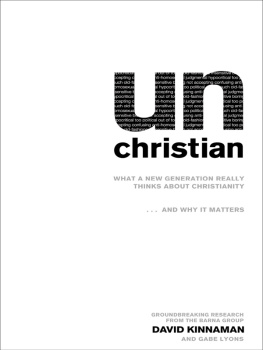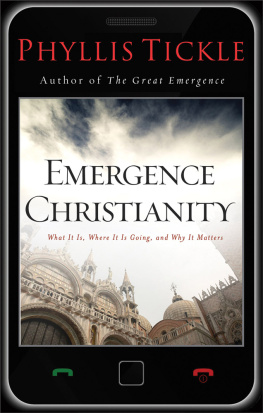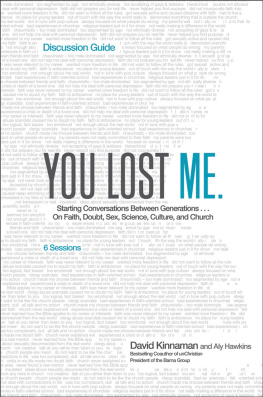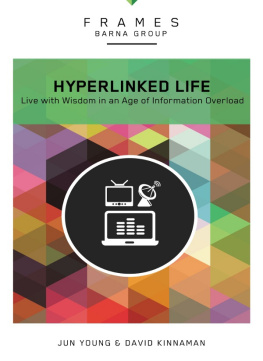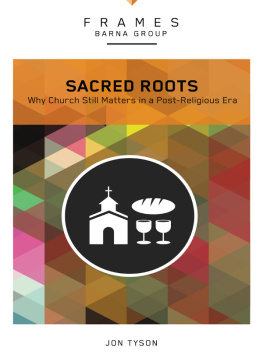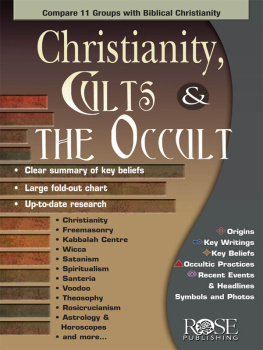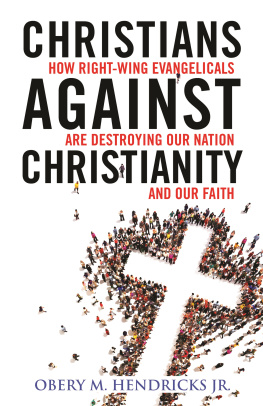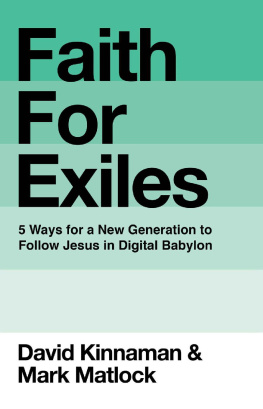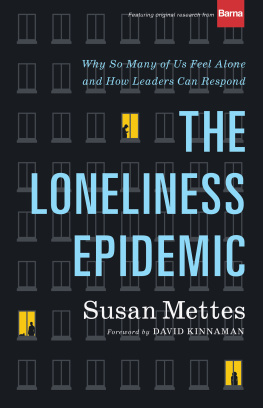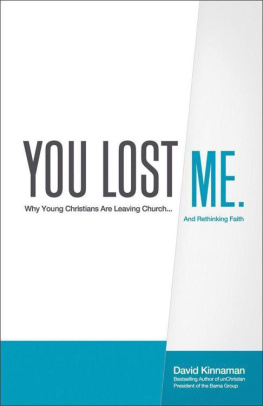un
christian
un
christian
WHAT A NEW GENERATION REALLY
THINKS ABOUT CHRISTIANITY
... AND WHY IT MATTERS
DAVID KINN AMAN
AND GABE LYONS

2007 by David Kinnaman and Fermi Project
Published by Baker Books
a division of Baker Publishing Group
P.O. Box 6287, Grand Rapids, MI 49516-6287
www.bakerbooks.com
E-book edition created 2009
All rights reserved. No part of this publication may be reproduced, stored in a retrieval system, or transmitted in any form or by any meansfor example, electronic, photocopy, recordingwithout the prior written permission of the publisher. The only exception is brief quotations in printed reviews.
ISBN 978-1-4412-0001-3
Library of Congress Cataloging-in-Publication Data is on file at the Library of Congress, Washington, DC.
Unless otherwise indicated, Scripture is taken from the Holy Bible, New Living Translation, copyright 1996. Used by permission of Tyndale House Publishers, Inc., Wheaton, IL 60189. All rights reserved.
Scripture marked NIV is taken from the HOLY BIBLE, NEW INTERNATIONAL VERSION . NIV . Copyright 1973, 1978, 1984 by International Bible Society. Used by permission of Zondervan. All rights reserved.
Scripture marked Message is taken from The Message by Eugene H. Peterson, copyright 1993, 1994, 1995, 2000, 2001, 2002. Used by permission of NavPress Publishing Group. All rights reserved.
Published in association with Yates & Yates, LLP, Attorneys and Counselors, Orange, California.
The participation of contributors in this book does not imply their endorsement of research interpretations or statements made by the authors and other contributors.
CONTENTS
About twelve years ago we had an intern from Biola University start working with us. I didnt think much about it. Wed had other interns, and they were usually nice kids seeking some college credit while doing as little as they could possibly get away with. If they learned something along the way, they seemed to perceive it as a bonus.
But theres always the exception to the rule. David Kinnaman was ours.
David was a tall, skinny, quiet kid who asked a lot of questionsgood onesand worked hard. He was clearly intelligent and a team player. He seemed genuinely interested in learning how marketing research was done and how such information could advance meaningful ministry. He was committed to making a viable contribution to our efforts.
By the time his graduation approached, we realized he could be a significant asset to our team, so we offered him a job. Since that time, he has done practically every function in the business, from grunt work to high-level presentations with major business and ministry clients. He has managed hundreds of national research studies, generated new business opportunities, created syndicated reports, interacted with the media to describe our research results, spoken at conferences, developed internal systems, hired and fired staffyou name it; hes done it all. He has worked his way up to become the president of The Barna Group. Yet despite having written hundreds of client reports and dozens of published articles, David had never felt led to write a book.
But theres always an exception to the rule. UnChristian is his.
This is his first book, but it is an important bookfor you, for the church, and for our nation. I encourage you to do four things in response to reading this volume.
First, appreciate David Kinnaman as one of a handful of young adults who are emerging today who understand the church, our nations culture, and how to bless people with truth and wisdom. This is a rare combination of gifts and talents. I expect David to be one of the people who will help the Christian community find its way through the maze of challenges and opportunities that await it. Such leadership is a huge gift from God, but we must appreciate that gift if we are to reap the benefit it represents.
Second, understand the depth and breadth of the objective research that forms the foundation of this book. Most of the books published about culture and faith are based on the authors personal opinions and a few idiosyncratic anecdotes. Such a basis for cultural evaluation is of limited value. David, on the other hand, has spent years collecting and studying reams of national survey data in an effort to truly grasp the big picture and its nuances. UnChristian is based on research, even though he has gone to great lengths to write the book in such a way that your eyes will not glaze over in response to an overload of statistics, charts, and tables. But that effort to make the research more digestible does not mean he has taken shortcuts. His effort is based on rigorous research and the difficult process of communicating statistics in everyday language.
Third, learn from the expert analysis and interpretation that David provides in relation to the perspective that our society has of American Christians and their faith. He has gone way beyond mere reporting of the data to dig deeper into the meaning and context of the findings. He has also interacted with numerous people to glean their insights into what the facts mean from their vantage point. What you are reading is a logical, carefully reasoned narrative about the past, present, and future state of society and the Christian faith.
Finally, I encourage you to pray. Pray that you will understand and be touched by the wisdom imparted in these pages. Pray for the Christian church, in all of its varieties, in America. Pray for your role in being the church to a culture that is gospel-ignorant, if not gospel-resistant. Pray for the leaders of the church, who must understand the arguments David has set forth in this book if they are to be strategic agents for the kingdom of God. And pray for your own influence for that kingdom in times that are changing, uncertain, and challenging.
One of the discussions that David and I have shared over the years is that God does not call leaders to be popular but only to be obedient to him. In that vein, I should warn you that David has written some things you will not like. So be it. Your job is not to anesthetize yourself with congratulatory prose about the state of the world or the church, but to deal with reality, even when it is embarrassing or hurtful. You dont have to like what he has written, but you do have to deal with it.
So I give my thanks to David for writing the truth, as best we can understand it. And I send my thanks to you for considering how these perspectives must affect your contribution to the kingdom of God and the world in which we serve him.
George Barna
Founder, The Barna Group
Chairman, Good News Holdings
May 2007
1
THE BACKSTORY
SEEING CHRISTIANITY FROM THE OUTSIDE
Christianity has an image problem.
If youve lived in America for very long, I doubt this surprises you. But it brings up important questions. Just what exactly do people think about Christians and Christianity? Why do these perceptions exist? Obviously, people believe their views are accurate (otherwise they would disavow them), but do their perceptions reflect reality? And why do peoples perceptions mattershould they matterto Christ followers?
I have spent the last three years studying these questions through extensive interviews and research. You may be astonished to learn just how significant the dilemma isand how the negative perceptions that your friends, neighbors, and colleagues have of Christianity will shape your life and our culture in the years to come. Our research shows that many of those outside of Christianity, especially younger adults, have little trust in the Christian faith, and esteem for the lifestyle of Christ followers is quickly fading among outsiders. They admit their emotional and intellectual barriers go up when they are around Christians, and they reject Jesus because they feel rejected by Christians. I will describe how and why this is happening later in this book, but for the moment think about what this means. It changes the tenor of peoples discussions about Christianity. It alters their willingness to commit their lives to Jesus.
Next page
